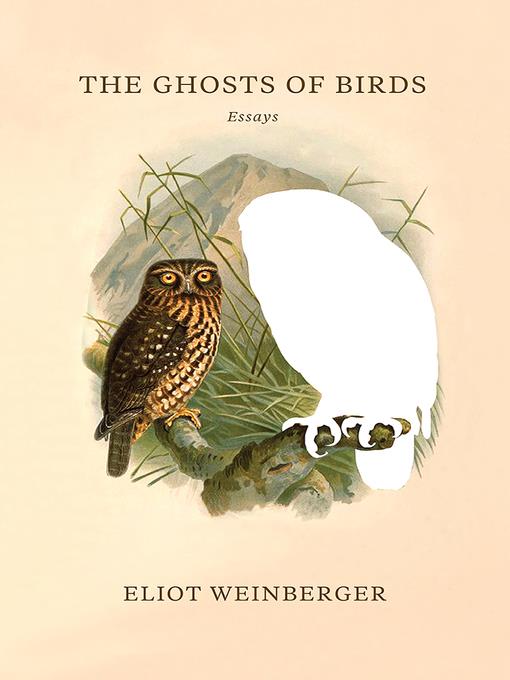
The Ghosts of Birds
کتاب های مرتبط
- اطلاعات
- نقد و بررسی
- دیدگاه کاربران
نقد و بررسی

July 25, 2016
This slim volume from Weinberger (The Walls, the City, and the World), a prodigious translator, editor, and author, provides abundant rewards for readers in essays that are short, dense, and rich with meanings and ideas. The selections display an aesthetic of distilled prose and a fascination with poking at the seams between reportage, fiction, and poetry. The book is separated into halves, the first of which is a sort of addendum to Weinberger’s haunting, meditative 2007 An Elemental Thing. In these new pieces, Weinberger discusses history, nature, and mythology—among other things—and interrogates the traditional form and function of the essay. He opens with a chapter dissecting the story of Adam and Eve, and from there casts a wide net over topics including dreams, American mythologies, and a cultural taxonomy of stones. The second section of the book contains more traditional essays, some looking at particular works, and several in the more experimental vein of the first half. Of particular note are his essay on indigenous Mexican poetry and his notorious 2010 review of George W. Bush’s memoir Decision Points, entitled “Bush the Postmodernist.” The latter is a withering piece of prose that manages to be simultaneously hilarious and horrifying, as acute a look at the 21st-century American condition as any produced to date.

The accomplished essayist, editor, and translator marries a thirst for other worlds with a questing intellect in this challenging menagerie of writings, some previously published.Weinberger (The Wall, the City, and the World, 2014, etc.) opens with a sufficiently engaging revision of the Adam and Eve story and attendant superstitions but then launches into a rather cryptic continuation of his serial essay An Elemental Thing, which, despite its often elegant poetics, may confound anyone who has not read the earlier installments. It may puzzle even if one has, given the section's preference for the esoteric, the ethereal, and the enigmatic. However, the author saves it with brief but arresting curiosities from a selection of world subcultures. A writer of impressive, sometimes-daunting erudition, Weinberger offsets this first section's forays into the obscure with measured, eye-opening considerations of subjects ranging from incarnations of the Buddha and the I Ching to the literature of the city and Mongol history, including a devastating critique of an exhibit at New York's Metropolitan Museum of Art. East Indian and Mexican poetry likewise get their due. These exhaustively researched pieces are richly detailed and unfailingly interesting. Contrastingly unrestrained yet telling is his scorched-earth review of George W. Bush's Decision Points. As an aesthete and literary "archaeologist," Weinberger also exhumes and recovers--or at least re-examines--the artistic reputations of a number of half-forgotten poets, authors, and intellectuals who were lions in their days. This is done with admirable sobriety and finesse and without a trace of hagiography, though for some, it may tend to bog down in minutiae and oddity. Weinberger says of the I Ching, "its fragments and aphorisms are meant to be dipped into at random." One might say the same of this book, which dazzles as a repository of knowledge and interpretation but otherwise may be an acquired taste. COPYRIGHT(1) Kirkus Reviews, ALL RIGHTS RESERVED.

























دیدگاه کاربران